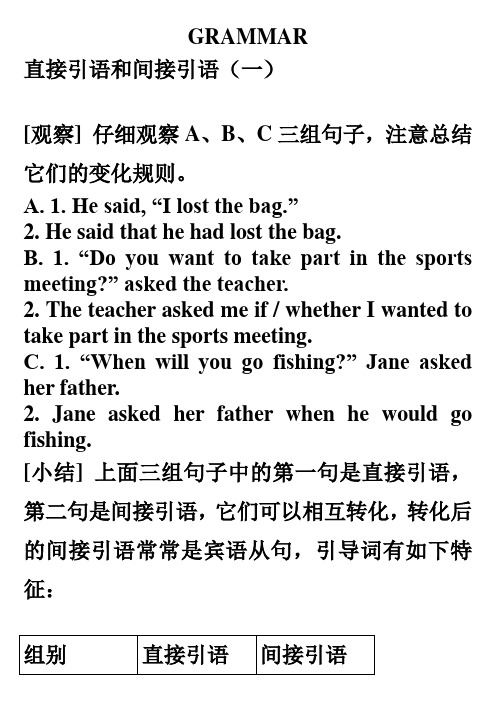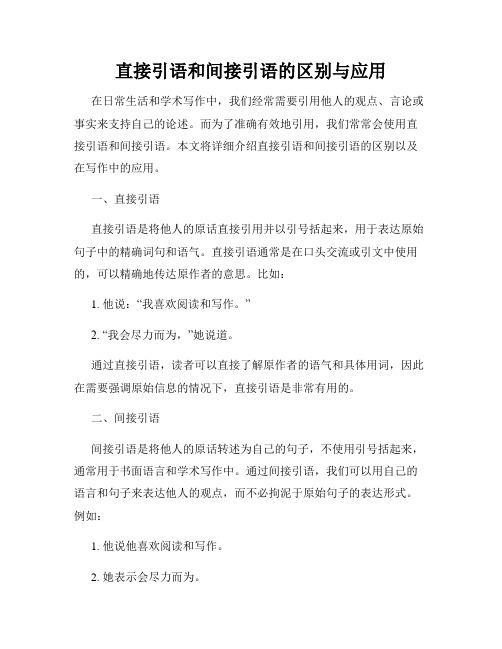直接引语与间接引语(1)
直接引语和间接引语

直接引语和间接引语(一)直接引述别人的原话,叫做直接引语;用自己话转述别人的话,叫做间接引语。
间接引语一般构成宾语从句。
直接引语必须放在引号内,间接引语则不用引号。
直接引语改为间接引语时,除将引语部分变成宾语从句外,还必须对直接引语中的人称、时态、指示代词、时间状语、地点状语等进行改变。
1. 时态的变化:直接引语变为间接引语时,通常受转述动词said,asked等的影响而使用过去化的时态,即把原来的时态向过去推,也就是一般现在时变一般过去时,现在进行时变为过去进行时等。
例如:Tom said to me,“My brother is doing his homework.”→Tom said to me that his brother was doing his homework.2. 人称代词、指示代词、时间状语、地点状语等等的变化;根据意义进行相应的变化。
如:She asked Jack,“Where have you been?” →She asked Jack where he had been.He said,“These books are mine.” →He said that those books were his.(二)直接引语改为间接引语时,都使用陈述语序,但是因为原句的句式不同,所以变成间接引语时所用的连词会有所不同。
1.陈述句的间接引语:陈述句由直接引语变间接引语,由that引导,可以省略。
“I want the blue one.” he told us. “我想要兰色的。
” 他说。
→He told us that he wanted the blue one.他说他想要兰色的。
She sa id to me, “You can’t do anything now.” 她对我说:“此刻你无法做任何事情。
”→She told me that I couldn’t do anything then.她对我说那时我无法做任何事。
直接引语与间接引语1

1.首先同学们先从概念上理解直接引语和间接引语:直接引用别人的话叫直接引语,用自己的话转述别人的话叫间接引语。
间接引语在多数情况下构成宾语从句。
直接引语前后加引号,间接引语不必加。
现用课本中的句子解释如下:直接引语:Marcia said, “She is having a surprise party for Lana on Friday night.”Lana said, “I‟m mad at Marcia.”间接引语:Marcia said that she was having a surprise party for Lana on Friday night.Lana said that she was mad at Marcia.2. 变直接引语为间接引语的方法:(1)直接引语的主语是第一人称,改为间接引语后要根据意思改变人称,如:Lana said, “I‟m mad at Marcia.”Lana said that she was mad at Marcia.注:若直接引语为陈述句,改为间接引语时,可以把that 省略。
(2)若主语谓语动词是一般过去时,直接引语变成间接引语要调整时态。
列表如下:通过上表,同学们可以了解Grammar Focus中直接引语与间接引语的变化方式了,如下:注:若直接引语部分是一种客观事实时,时态不变,如:The teacher said, “The earth goes round the sun.该为间接引语:The teacher said that the earth goes round the sun.(4) 若直接引语为一般疑问句(即倒装语序,改为间接引语时要用陈述句语序,而且要用连词if或whether。
如本单元Self—check部分中的第二题中的“She asked me if she could copy my homework.”就是由直接引语“She asked me, …can I copy your homework?‟”变化而来。
直接引语和间接引语【3篇】

直接引语和间接引语【3篇】(经典版)编制人:__________________审核人:__________________审批人:__________________编制单位:__________________编制时间:____年____月____日序言下载提示:该文档是本店铺精心编制而成的,希望大家下载后,能够帮助大家解决实际问题。
文档下载后可定制修改,请根据实际需要进行调整和使用,谢谢!并且,本店铺为大家提供各种类型的经典范文,如总结报告、演讲发言、策划方案、合同协议、心得体会、计划规划、应急预案、教学资料、作文大全、其他范文等等,想了解不同范文格式和写法,敬请关注!Download tips: This document is carefully compiled by this editor. I hope that after you download it, it can help you solve practical problems. The document can be customized and modified after downloading, please adjust and use it according to actual needs, thank you!Moreover, our store provides various types of classic sample essays, such as summary reports, speeches, planning plans, contract agreements, insights, planning, emergency plans, teaching materials, essay summaries, and other sample essays. If you want to learn about different sample formats and writing methods, please pay attention!直接引语和间接引语【3篇】直接引语和间接引语篇一1.直接引语直接引用别人的原话叫做直接引语,直接引语通常置于引号内(“引用原话”)。
直接引语和间接引语

直接引语和间接引语1.直接引语和间接引语概述:(一)直接引语和的定义:直接引用人家的原话,被引用的部分称为直接引语。
用自己的话把他人的原话表达出来,被转述的部分称为间接引语。
例如:He said:“I am going to see a football match.”(直接引语)He said that he was going to see a football match. (间接引语)(二)直接引语的构成:①直接引语要用引号与句子的其他部分分开。
②直接引语对于原话不做任何变动,保持原来的句型结构,人称,时态和标点符号等。
③直接引语没有时态呼应的问题,不需要和句子的谓语动词保持一致。
(三)间接引语的构成:①间接引语的基础是直接引语,直接引语转化为间接引语有以下原则:1 去掉冒号和引号,用从属连词将间接引语和主句相连,构成一个主从复合句。
2 人称要做相应的调整。
3 时态调整时要注意时态的呼应。
2.直接引语转化为间接引语:①当直接引语主句的谓语动词是过去时时,其后面间接引语中的谓语动词都应该是过去时。
例如:She said:“I will go swimming tomorrow.”She said that she would go swimming the next day.Tom told me:“I went to Beijing last month.”Tom told me that he had gone to Beijing.Jack told me:“I have waited for you for a long time.”Jack told me that he had waited for me for a long time.②当句子的谓语动词是现在时时,间接引语的动词时态保持不变。
例如:He says:“I want to study English.”He says that he wants to study English.③如果直接引语说的是一般真理或是永恒的事实,在变为间接引语时,仍然保持原来的时态。
直接引语间接引语(unit1-2语法总结)

GRAMMAR直接引语和间接引语(一)[观察] 仔细观察A、B、C三组句子,注意总结它们的变化规则。
A. 1. He said, “I lost the bag.”2. He said that he had lost the bag.B. 1. “Do you want to take part in the sports meeting?” asked the teacher.2. The teacher asked me if / whether I wanted to take part in the sports meeting.C. 1. “When will you go fishing?” Jane asked her father.2. Jane asked her father when he would go fishing.[小结] 上面三组句子中的第一句是直接引语,第二句是间接引语,它们可以相互转化,转化后的间接引语常常是宾语从句,引导词有如下特征:同时,时态也要进行相应的变化,一般规律如下:[温馨提示]1.注意宾语从句使用陈述语序。
Father said, “What’s the matter?”→Father said what was the matter.2. 直接引语变为间接引语时,一些词或词组也要变。
如:指示代词:this → that, these → those; 动词:come → go; 时间:now → then, tomorrow → the next day; last week → the week before; 地点:here → there; 人称:I → he / she ... 等。
如:Tom said, “I will come here with my father tomorrow.” →Tom said he would go there with his father the next day.3. 当直接引语强调的是客观事实或真理,变为间接引语时,从句中的时态不变。
英语中的直接引语和间接引语

英语中的直接引语和间接引语一、直接引语和间接引语的概念1. 直接引语- 直接引语就是直接引用别人的原话,被引用的部分通常放在引号内。
例如:He said, "I am going to the park." 在这个句子中,“I am going to the park.”就是直接引语,它原封不动地呈现了说话者所说的内容。
2. 间接引语- 间接引语是用自己的话转述别人的话,不用引号。
例如:He said that he was going to the park. 这里“he was going to the park”就是间接引语,它是对原句“He said, 'I am going to the park.'”的转述。
二、直接引语变间接引语的变化规则1. 人称的变化- 如果直接引语中的主语是第一人称(I或we),在变为间接引语时,要根据句子的意思相应地变为第三人称(he/she或they)。
- 例如:- 直接引语:I said, "I like this book."- 间接引语:I said that I liked this book.(这里因为主语都是I,人称不变,但如果是He said, "I like this book." 变为间接引语就是He said that he liked this book.)- 如果直接引语中的第二人称(you),在变为间接引语时,要根据转述者和听话者的关系变为第一人称(I/we)或第三人称(he/she/they)。
- 例如:- 直接引语:He said to me, "You are a good student."- 间接引语:He told me that I was a good student.- 直接引语:He said to her, "You should study hard."- 间接引语:He told her that she should study hard.2. 时态的变化- 一般现在时变为一般过去时。
直接引语和间接引语的区别与应用

直接引语和间接引语的区别与应用在日常生活和学术写作中,我们经常需要引用他人的观点、言论或事实来支持自己的论述。
而为了准确有效地引用,我们常常会使用直接引语和间接引语。
本文将详细介绍直接引语和间接引语的区别以及在写作中的应用。
一、直接引语直接引语是将他人的原话直接引用并以引号括起来,用于表达原始句子中的精确词句和语气。
直接引语通常是在口头交流或引文中使用的,可以精确地传达原作者的意思。
比如:1. 他说:“我喜欢阅读和写作。
”2. “我会尽力而为,”她说道。
通过直接引语,读者可以直接了解原作者的语气和具体用词,因此在需要强调原始信息的情况下,直接引语是非常有用的。
二、间接引语间接引语是将他人的原话转述为自己的句子,不使用引号括起来,通常用于书面语言和学术写作中。
通过间接引语,我们可以用自己的语言和句子来表达他人的观点,而不必拘泥于原始句子的表达形式。
例如:1. 他说他喜欢阅读和写作。
2. 她表示会尽力而为。
通过间接引语,我们可以更好地整合他人的观点,将其融入到我们自己的文章中,并且可以对引用内容进行适当的修改和解释,以便更好地服务于我们的写作目的。
三、区别与应用直接引语和间接引语在使用时有以下几个区别和应用场景:1. 引用方式:直接引语使用引号括起来,而间接引语不使用引号。
2. 词语转述:直接引语尽可能准确地使用原作者的词句,而对于间接引语,我们可以根据需要对他人的观点进行适当的修改和解释。
3. 语序和语气:直接引语保留了原始句子的语序和语气,而间接引语则可以根据需要进行调整。
4. 使用场景:直接引语适用于口头交流、引文和需要强调原始信息的情况,而间接引语则更适用于书面语言、学术写作和需要整合他人观点的情况。
在使用直接引语和间接引语时,我们需要注意以下几点:1. 引用准确性:无论是直接引语还是间接引语,我们都需要确保准确地引用他人的言论。
可以通过参考可靠的来源,如书籍、文章或学术论文,在引用时注明出处。
直接引语和间接引语的区别和用法

直接引语和间接引语的区别和用法
直接引语和间接引语的区别和用法
一、直接引语的定义
直接引语是指引用某人曾经说过的话,将原话按原样(全部或部分)写出来,并用引号括起来,以区别于正文的写法。
二、间接引语的定义
间接引语是指把某人曾经说过的话,用自己的语言写出来,以表示对原话的转述。
三、直接引语与间接引语之间的区别
1、原文形式的不同:直接引语是用原文来直接引用某人的话,而间接引语是用自己的话来表达某人原来所说的话;
2、标点符号的不同:直接引语是用引号括起来,以表示引用,而间接引语没有用引号。
3、语气的不同:直接引语表示的是原话的语气,间接引语表示的是引用者的语气。
四、直接引语和间接引语的用法
1、直接引语的用法
(1)引用形式可以是全文、部分文、句子或单词等;
(2)把引号括起来,以区别于正文文体;
(3)为了实现彻底的分离,也可以用段落的形式来引用;
(4)引号内的文字不用修订病句;
(5)语气用词保留原文的语气,不能换成自己的说法。
2、间接引语的用法
(1)用句子的形式表达原话;
(2)保留原文的意思,但可以改变句式;
(3)可以改变原话的语气;
(4)谓语命中后面的人称和时态要和句子的主语保持一致。
- 1、下载文档前请自行甄别文档内容的完整性,平台不提供额外的编辑、内容补充、找答案等附加服务。
- 2、"仅部分预览"的文档,不可在线预览部分如存在完整性等问题,可反馈申请退款(可完整预览的文档不适用该条件!)。
- 3、如文档侵犯您的权益,请联系客服反馈,我们会尽快为您处理(人工客服工作时间:9:00-18:30)。
直接引语与间接引语(1)本单元语法:直接引语与间接引语(1)一、定义直接引用别人的原话,两边用引号“”标出,叫做“直接引语”;用自己的语言转述别人的话,不需要引号,这叫做“间接引语”。
实际上间接引语大都是宾语从句(其中由祈使句转换的间接引语除外,其转换后是不定式)。
例如:John said, “I’m going to London with my father.”约翰说:“我要和父亲到伦敦去。
”(引号内是直接引语)John said that he was going to London with his father.约翰说,他要和他父亲去伦敦。
(宾语从句是间接引语)二、用法直接引语变间接引语时,要用连接词引导,从句中人称、时态、指示代词、时间状语、地点状语要做相应的变化。
具体有:(一)人称的变化:在将直接引语变间接引语时,人称变化有一句顺口溜:“一随主,二随宾,第三人称不更新”。
具体内容是:(1)“一随主”是指在直接引语变间接引语时,如果从句中的主语是第一人称或被第一人称所修饰。
从句中的人称要按照主句中主语的人称变化。
例如:She said, “My brother wants to go with me.”→She said her brother wanted to go with her. 她说她弟弟想和她一起去。
(2)“二随宾”是指直接引语变间接引语时,若从句中的主语及宾语是第二人称,或被第二人你所修饰。
从句中的人称要跟引号外的主句的宾语一致。
如果引号外的主句没有宾语。
也可以用第一人称。
例如:He said to Kate, “How is your sister now?”→He asked Kate how her sister was then. 他问凯特她的妹妹怎么样了。
(3)“第三人称不更新”是指直接引语变间接引语时。
如果从句中的主语及宾语是第三人称或被第三人称所修饰,从句中的人称一般不需要变化。
例如:Mr Smith said, “Jack is a good worker.”→Mr Smith said Jack was a good worker. 史密斯先生说杰克是个好工人。
(二)时态的变化:直接引语在改为间接引语时、时态需要做相应的调整。
如果主句的时态是一般现在时,从句的时态不需要变化;如果主句的时态是一般过去时,从句的时态要做相应的变化。
本单元要掌握的是:当主句的时态是一般过去时时,从句如果是一般现在时,应变为一般过去时。
其他时态变化,我们会在下个单选详细讲解。
(三)状语、指示代词、动词的变化:2. 指示代词:this变that;these 变成those3. 地点状语:here变成there4. 动词:come变成go,bring变成take(四)句子结构的变化。
直接引语如果是陈述句,间接引语应改为由that引导的宾语从句,that在口语中常省略。
例如:She said, “Our bus will arrive in five minutes.”→She said that their bus would arrive in five minutes.她说他们的公共汽车五分钟后到达。
这是我们本单元主要应该掌握的内容,其他句子结构的变化我们会在下个单元讲解。
语法专练1. She says, “Something is wrong with my bike.”→She says that something is wrong with ______ bike.A. myB. aC. hisD. her2. Tom said, “ I’m living with my parents.”Tom said that _______was living with his parents.A. IB. youC. heD. they3. I’d like to tell you that you ______the exam.A. have passedB. had passedC. passD. will pass4. Jane said that __________.A. was she glad to see youB. she is glad to see youC. she was glad to see youD. is she glad to see you5. She said ___________.A. I like tennisB. I liked tennisC. she likes tennisD. she liked tennis6. He said to Lily __________.A. She had to get up earlyB. did she have to get up earlyC. she have to get up earlyD. she has to get up early7. He said __________.A. nobody likes himB. nobody likes meC. nobody like heD. nobody liked him答案与解析1. D。
主语是she, 其形容词性物主代词是her。
2. C。
句意为“Tom 说他和他父母住在一起。
”故应该选人称代词he3. A。
would like 知识委婉语气,并非过去时,所以本句使用现在完成时即可,故选A。
4. C。
间接引语语序应该是陈述句语序,故排除A、D项;主句谓语是过去时,故从句谓语应该用was。
因此答案是C。
5. D。
句意:“她说她喜欢网球。
”因此A、B项人称不对,主句是过去时,故C项时态不对。
因此答案是D。
6. A。
句意:“他对Lily说她必须早点起床。
”B项的语序不对,C、D的时态不对,故选A。
7. D。
句意:“他说没有人喜欢他。
”故B项人称不对,主句是过去时,故从句应该用相应的过去时,排除B、C项。
故正确答案是D。
初中英语直接引语变间接引语练习题一、将所给直接引语变为间接引语,每空一词:1. “I never eat meat.”he said. He said that ______ never ______ meat.2. “I’ve found my wallet.”he said to me. He ______ me that he ______ ____________ wallet.3. “I took it home with me.”she said. She said that ______ ______ _______ it home with her.4. The teacher said, “The sun rises in the east and goes down in the west.” The teacher said that the sun ______ in the east and ______ down in the west.5. “I met her yesterday.” he said to me. He ______ me that he ______ met the day ______.6. “You must come here before five.” he said. He said that I ______ to go ______ before five.7. “I bought the house 10 years ago.” he sai d. He said that he _______ bought the house 10 years _______.8. “Did you see her last week?” he said. He ______ ______ I had seen her the week _______.9. He said, “You can sit here, Jim.” He ______ Jim that he ______ sit there.10. He ask ed, “How did you find it, mother?” He asked her mother ______ ______ ______ found it.11. “Where have you been these days?” he asked. He asked me _______ _______ _______been _______ days.12. “Do you know where she lives?” he asked. He asked ______ ______ knew where she ______.13. “Stop making so much noise, children.” he said. He ______ the children ______ ______ making so much noise.14. “Don’t tell him the news.” she said. She told me _______ ______ ______ him the news.15. “Are you intested in this?” he said. He ______ ______ I was interestd in ______.16. “I am having supper,” he said. He said that _______ _______ having supper.17. “I’ve seen the film,” Gina said to me. Gina _______ me that she _______ _______ the film.18. “I went home with my sister,” she said. She said that _______ _______ _______ home with her sister.19. “Keep quiet, children.”he said. He _______ the children _______ _______ quiet.20. “Don’t look out of the window,”she said.She told me _______ _______ _______ out of the window.【参考答案】 1. he, ate 2. told, had, found, his 3. she, had, taken 4. rise, goes 5. told, had, before 6. had, there 7. had, before 8. asked, if [whether], before 9. told, could 10. how, she, had 11. where, I, had, those 12. if [whether], I, lived 13. told, to, stop 14. not, to, tell 15. asked, if [whether], that 16. he, was。
